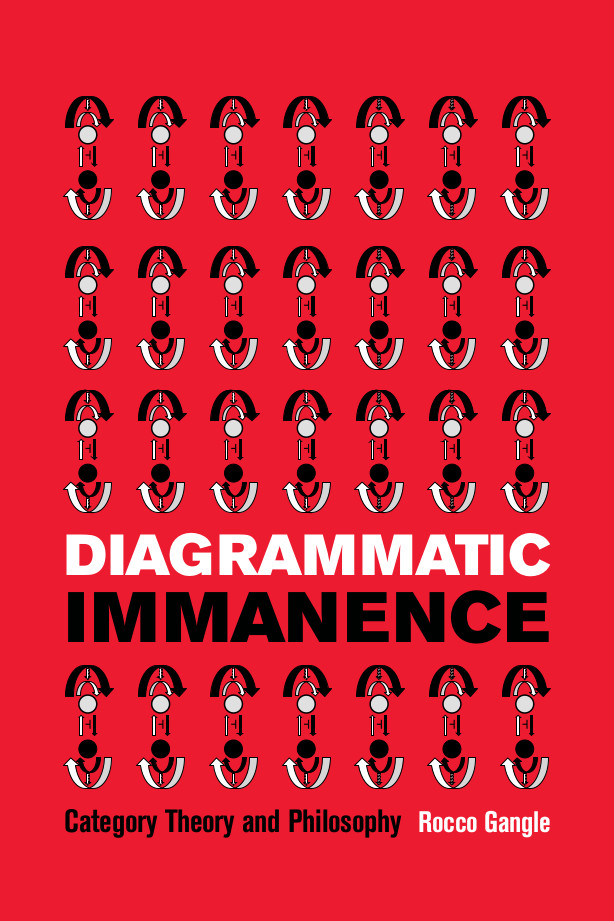Rocco Gangle: Diagrammatic Immanence: Category Theory and Philosophy (2015)
Filed under book | Tags: · category theory, diagram, graph, immanence, mathematics, metaphysics, philosophy, semiotics

“A renewal of immanent metaphysics through diagrammatic methods and the tools of category theory.
Spinoza, Peirce and Deleuze are, in different ways, philosophers of immanence. Rocco Gangle addresses the methodological questions raised by a commitment to immanence in terms of how diagrams may be used both as tools and as objects of philosophical investigation. He integrates insights from Spinozist metaphysics, Peircean semiotics and Deleuze’s philosophy of difference in conjunction with the formal operations of category theory.
Category theory reveals deep structural connections among logic, topology and a variety of different areas of mathematics, and it provides constructive and rigorous concepts for investigating how diagrams work. Gangle introduces the methods of category theory from a philosophical and diagrammatic perspective, allowing philosophers with little or no mathematical training to come to grips with this important field.
This coordination of immanent metaphysics, diagrammatic method and category theoretical mathematics opens a new horizon for contemporary thought.”
Publisher Edinburgh University Press, 2015
ISBN 1474404170, 9781474404174
256 pages
via wX
PDF, PDF (updated on 2016-11-20)
Comments (2)Robert Rosen: Essays on Life Itself (1999)
Filed under book | Tags: · algorithm, anticipation, biology, causality, complex systems, complexity, environment, life, machine, mathematics, mind, philosophy of science, physics, science, semantics, systems theory, technology, theory

“In this collection of twenty-two essays, Rosen takes to task the central objective of the natural sciences, calling into question the attempt to create objectivity in a subjective world. The book opens with an exploration of the interaction between biology and physics, unpacking Schrödinger´s famous text What Is Life? and revealing the shortcomings of the notion that artificial intelligence can truly replicate life.
He also refutes the thesis that mathematical models of reality can be reflected entirely in algorithms, that is, are of a purely syntactical character. He argues that it is the noncomputable, nonformalizable nature of biology that makes organisms complex, and that these systems are generic, whereas those systems described by reductionistic reasoning are simple and rare.
An intriguing enigma links all of the essays: ‘How can science explain the unpredictable?'”
Publisher Columbia University Press, 1999
Complexity in Ecological Systems series
ISBN 023110510X, 9780231105101
x+360 pages
Reviews: Bruce J. West (Quarterly Review of Biology, 2001), Donald C. Mikulecky (c1999).
PDF (removed on 2019-10-30 upon request from Judith Rosen)
Comment (0)Friedrich Kittler: Musik und Mathematik I. Hellas 1: Aphrodite (2006) [German]
Filed under book | Tags: · antiquity, greece, mathematics, media, media history, media theory, mimesis, music, music history, song, writing

“‘Wir möchten euch Musik und Mathematik erzählen: das Schönste nach der Liebe, das Schwerste nach der Treue.’ Die beiden Worte, die den Titel einer Tetralogie aus Hellas, Roma Aeterna, Hesperien und Turing-Galaxis bilden, stehen für die Wurzeln von Kunst und Wissen: musikè, die Lust des Singens, Tanzens, Spielens heißt nach der Muse, die im Herzen alles aufbewahrt und daher davon sagen kann. Musik macht also nach, was Musen tun, seit sie auf ihrem Götterberg mit allem Singen angehoben haben. Aus fast dem selben Ursprung stammt mathesis, das Lehren im allgemeinen, und Mathematik, das Denken über Zahlen im besonderen. Bei Homer heißt mathein nämlich noch nicht zählen oder rechnen, wie Aristoteles gelehrt hat, mathôn nennt vielmehr ein dunkles Wissen, das Helden erst nach Jahrzehnten des Erfahrens in Fleisch und Blut gegangen ist. Unter den wenigen Reimen, die in Griechenohren widerhallten, blieb der alte Spruch von pathein/mathein, leiden und lernen unverloren.”
Publisher Wilhelm Fink, Munich, 2006
ISBN 3770537823, 9783770537822
409 pages
via lostobserver, einzelne
Reviews: Jürgen Busche (FAZ), Roland Lysell (Swedish, Samlaren).
PDF (13 MB, updated on 2019-4-20)
ARG (updated on 2019-4-20)

